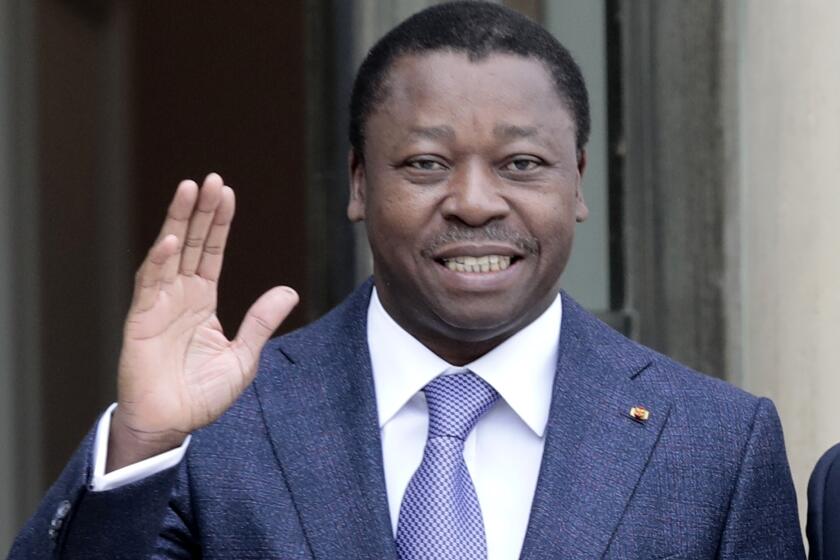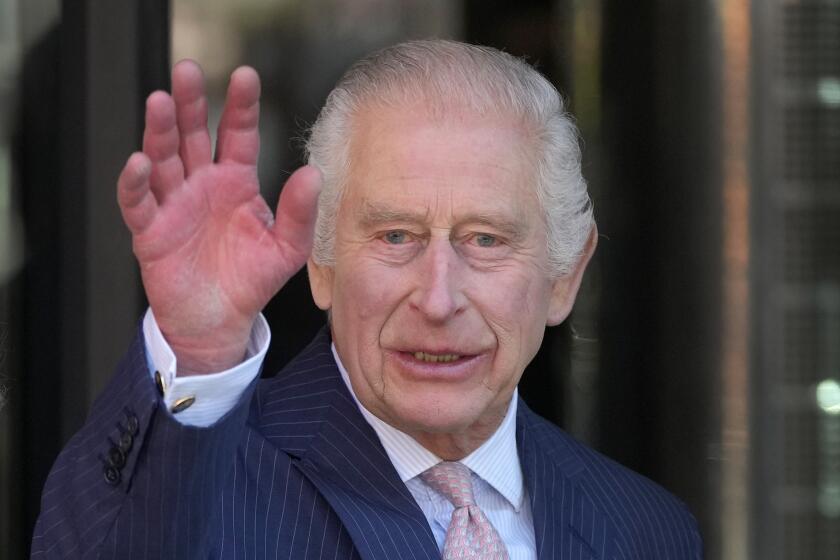Chinese Youth Discover the Thrill of Voting -- for a Favorite Artist
She wears boyish clothes and has short, spiky hair, but for millions of Chinese, she’s a Supergirl.
Her name is Li Yuchun, and she is China’s newest star, chosen from the people and by the people in an open “election” rare in communist China.
More than 400 million television viewers watched the final episode of the wildly popular “Supergirl” singing contest this summer -- more than the entire population of the United States. And although critics tagged the 21-year-old music student from Sichuan province as an unconventional personality with a mediocre voice and limited appeal, more than 3.5 million viewers voted for her.
“For the first time,” said Victor Yuan, an independent pollster based in Beijing, “people had the opportunity to pick their own winner.”
Despite some apparent irregularities with the cellphone voting, the Supergirl movement unleashed a debate on the merits of democracy and the need for a more open society.
A popular-culture contest and a popular vote may not be exactly the same, but some people think Beijing has cause to be nervous about the potential to spread the seeds of political reform. This spring, student activists used cellphone text messages and e-mail to organize nationwide anti-Japanese demonstrations.
“Maybe not right away,” Yuan said, “but in the long run, people might say, ‘Hey, why not elect a mayor the way we elected the Supergirl?’ ”
Last weekend, as Beijing’s unelected party leaders huddled behind closed doors to discuss the country’s future, the young people of China were busy celebrating the victory of their chosen one. In front of 60,000 screaming fans Sunday, Li and the other finalists rocked Workers Stadium in Beijing.
In many ways, the night belonged to Li, whose fresh look and androgynous mystique is helping change the way people think about beauty in a country where the typical female celebrity has long hair, big eyes and a scripted sweetness, and usually sings an octave or two above Li.
“Our whole family voted for her -- she’s the best,” said Zhao Mingzhe, who traveled from the northeastern city of Changchun to hear the tall and lanky Li sing in her tight white pants and black tuxedo top. But like hundreds of other fans, she was unable to get a ticket to the highly anticipated concert.
Instead of leaving, Zhao and her sister hung out by the stadium’s closed gates with other fans, picking up posters and other Supergirl paraphernalia.
“I’m happy to support her from the outside,” Zhao said. “The show would never be this hot without her.”
As in a fairy tale, serendipity changed the life of the daughter of a provincial railroad cop. A friend was going to the audition for the “American Idol”-like show and Li went along to keep her company. Instead, she landed on the program.
There have been innuendos about her sexuality, but rather than hurting her, it may have helped. Some say the audience fell in love with her because she was the only “boy” in a contest for girls.
“She is just so cool,” said Sun Jinhuan, 21, a clerk at a Beijing clothing stall.
From pundits on state news agencies to anonymous bloggers on the Internet, everybody is talking about the Supergirl craze. Newspapers and magazines don’t let an issue pass without a tidbit on the meteoric rise of Li and the other finalists. Biographies of them are instant bestsellers. Plans for an online version of the contest is underway. Even Time magazine’s Asian edition put Li on its latest cover as one of its “Asia’s Heroes 2005.”
All this proves that Beijing’s stodgy state media have been out of touch with the changing sensibility of Chinese youth, said Hong Huang, publisher of the Chinese version of Seventeen magazine.
“Chinese youths are the most underheard voices in China,” Hong said. “They’ve never had anything as empowering as the Supergirl contest. They chose Li Yuchun not because there’s been some dramatic new change in taste. The change has been going on for the past 10, 20 years. Conventional institutions refused to recognize it.”
Chinese youth certainly seized the moment. They organized fan clubs on the Internet, picked leaders and plotted strategies. Most visibly, they hit the streets to lobby for their favorite candidates.
“It’s totally democracy in action,” said Zhou Wei, 23, a college student who prefers the runner-up, Zhou Bichang. “From old ladies to young kids, everyone could vote. Even my mom voted. And I was so mad because she voted for Li Yuchun.”
Jin Xin, 18, is a college freshman who spent an entire month of her summer vacation in two of Beijing’s busiest pedestrian shopping malls in support of Zhou, the runner-up. She passed out fliers, held up posters and showed people her parents’ age how to text-message.
“I was there from 9 in the morning until 10 at night,” said Jin, who came to the Supergirl concert with a group of friends she met on the campaign trail. “I got more than 1,000 votes.”
In the process, the girls learned about the limits of democracy and the temptation of voter fraud. Technically, each cellphone could cast only 15 votes. Some impatient fans grabbed cellphones and forced the choice on strangers. Others hired people to vote their way or simply bought stacks of calling cards.
Because of the sensitive nature of this exercise in democracy, there had been talk that the show would be canceled next year. But organizers said they were only taking a break to prepare for a new revolution: “Superboys.”
More to Read
Start your day right
Sign up for Essential California for news, features and recommendations from the L.A. Times and beyond in your inbox six days a week.
You may occasionally receive promotional content from the Los Angeles Times.






